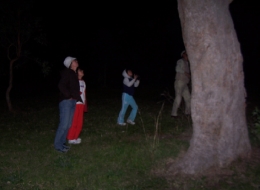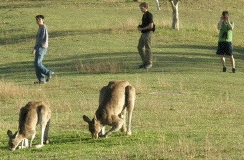 |
|||||||
| Home |
Tours |
Wildlife | Our region | Prices | About Araucaria |
Contact us |
|
Wildlife conservation and wildlife tourism
Also
see wildlife
conservation, ecotourism,
animal welfare and environmental
education
 Sustainable wildlife
tourism has the potential to introduce many hundreds
of thousands of people to the wonders of this
planet's wildlife, but there is always a risk of
disturbing or even destroying the very animals we
seek. Potential problems include:
Sustainable wildlife
tourism has the potential to introduce many hundreds
of thousands of people to the wonders of this
planet's wildlife, but there is always a risk of
disturbing or even destroying the very animals we
seek. Potential problems include:- disturbance of
habitat - e.g. over-gathering of logs for
firewood, clearing vegetation for tourism
accommodation or new roads, trampling of
understorey plants
- disruption of
important behaviours - e.g. repeatedly scaring
animals from favoured feeding or nesting grounds,
artificial feeding of animals causing dependency,
diet of inappropriate foods or a population
increase in one species to the detriment of
others, separating mothers from infants
- direct injury or death - e.g. by careless driving, inadvertently trampling nests or burrows, or deliberate illegal killing of less popular animals such as snakes
- all of the above can
include negative impacts not only on the animals
tourists and guides are conscious of, but of shy
or cryptic species that may disappear or be
impacted in some way without anyone noticing
Wildlife tourism can also bring benefits to wildlife conservation:
- protecting land that may otherwise be stripped of its native habitats for other pursuits
- restoring appropriate
habitat
- donating money to
wildlife conservation
by operators or tourists
- conservation breeding of threatened species to be returned to the wild
- education about ecological
needs of wildlife, and awareness of animals
many do not know the existence of
- keeping an eye on possible illegal activities involving wildlife or their habitats
- monitoring the occurrence, abundance and behaviour of wildlife to check for any changes from year to year
We need to maximise the positive and minimise the negative impacts
She is also chair of the Scenic Rim branch of the Wildlife Preservation Society of Queensland (see Facebook page http://www.facebook.com/Scenic.Rim.Wildlife). Ronda and Darren are on the committee for Protect The Bush Alliance.
Araucaria Ecotours is a member of Ecotourism Australia (through which we have achieved advanced ecocertification for all our tours), and we are personally members of the Lamington Natural History Association, the Australian Orangutan Project and the Logan and Albert Conservation Association.
In 2019 Ronda Green has been working with Prof Noel Scott on a survey for UNWTO of responsible wildlife tourism in ASIA AN THE PACIFIC.
 Ronda has been
leading tours and
field excursions into
wildlife habitat for
many years,
always very mindful of
the value of
experiencing nature
and helping others to
do so while not unduly
disturbing the animals
and their
environments. She has
also conducted
extensive literature
research plus
interviews with
tourists, tour
operators and
conservation managers
for the Sustainable
Tourism Cooperative
Research Centre,
published (with
co-author Karen
Higginbottom)
a report on 'Negative
Effects of Wildlife
Tourism on Wildlife'.
and
several
other
related
publications.
She was also second
author ( with Karen
Higginbottom and
Chelsea Northrope) on
'Positive
Effects
of Wildlife Tourism
on Wildlife.'
Ronda has been
leading tours and
field excursions into
wildlife habitat for
many years,
always very mindful of
the value of
experiencing nature
and helping others to
do so while not unduly
disturbing the animals
and their
environments. She has
also conducted
extensive literature
research plus
interviews with
tourists, tour
operators and
conservation managers
for the Sustainable
Tourism Cooperative
Research Centre,
published (with
co-author Karen
Higginbottom)
a report on 'Negative
Effects of Wildlife
Tourism on Wildlife'.
and
several
other
related
publications.
She was also second
author ( with Karen
Higginbottom and
Chelsea Northrope) on
'Positive
Effects
of Wildlife Tourism
on Wildlife.'On behalf of Wildlife Tourism Australia Ronda has contributed some years ago and again more recently to the wildlife guidelines for Ecotourism Australia's eco-certification process and has led various related workshops including one leading to WTA's policy statement on the feeding of wildlife and other conservation-related matters. She has now been chair of WIldlife Tourism Australia for several years and has organised and conducted several conferences, workshops and displays. She has also authored a book on wildlife tourism and co-edited another on the topic.
See also various relevant publications and presentations by Ronda. plus numerous publications on wildlife tourism and conservation by other authors in the Wildlife Tourism Australia bibliography